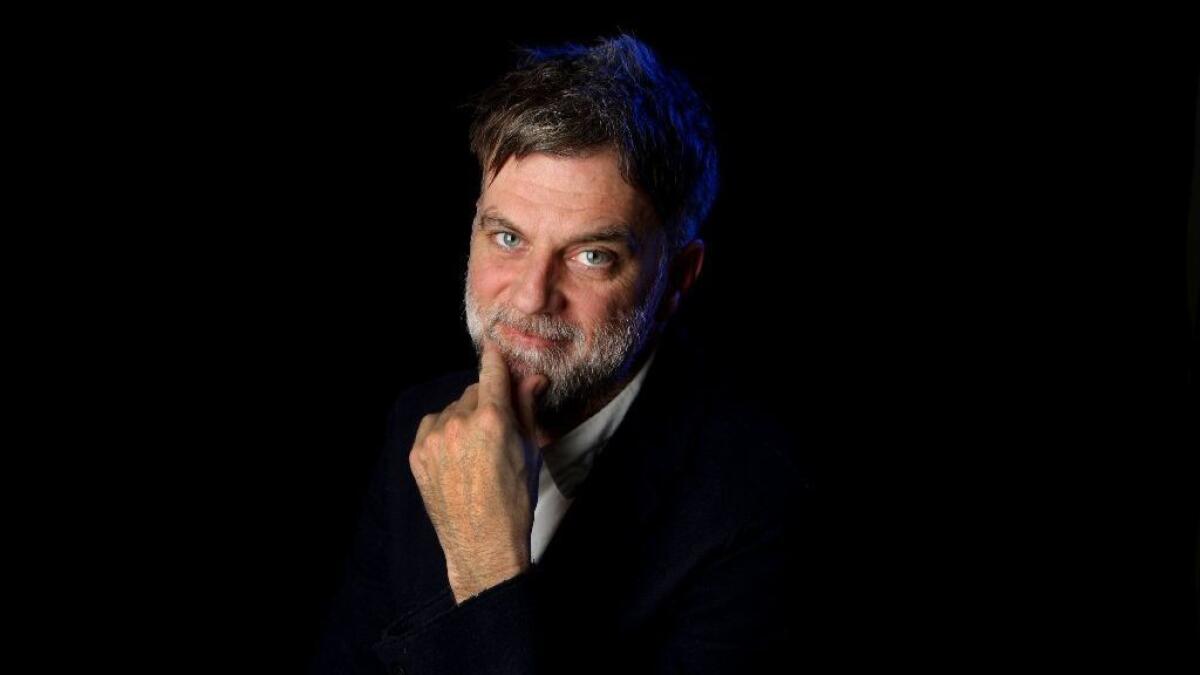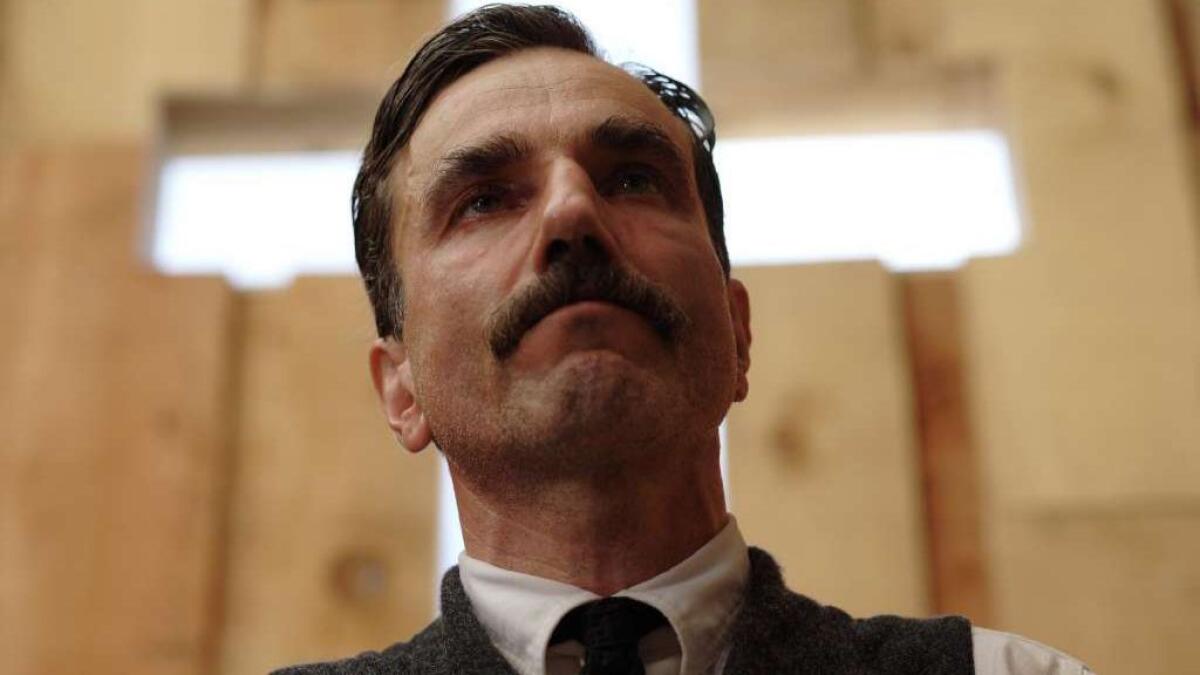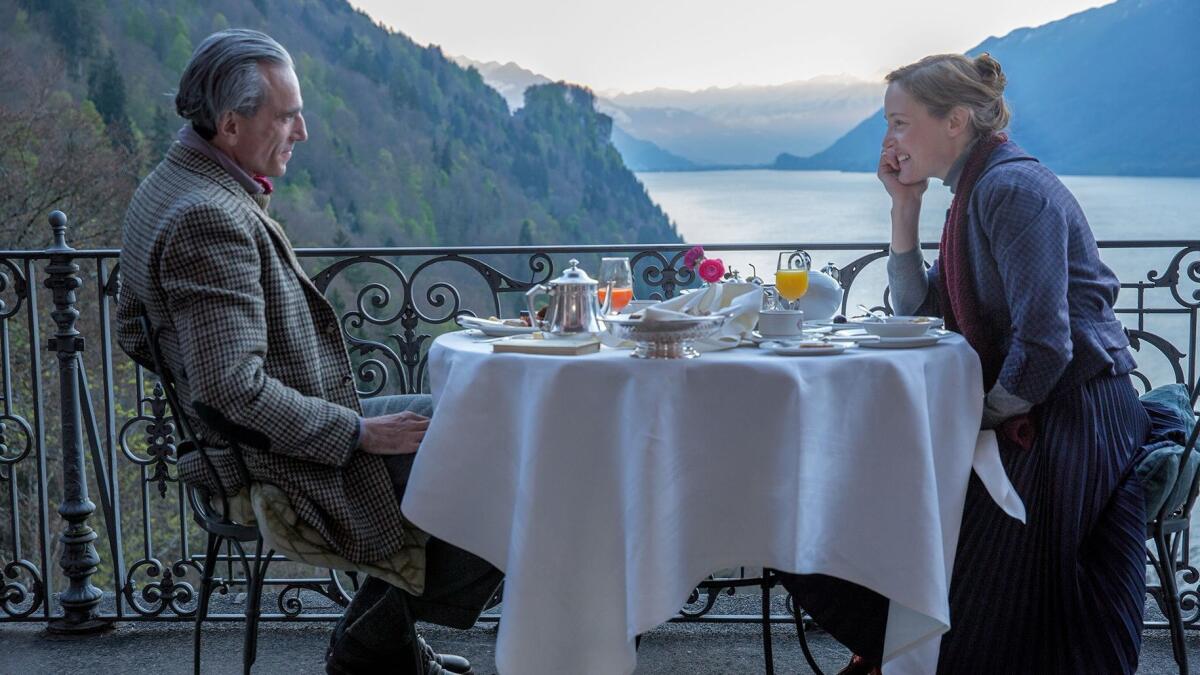Q&A: ‘Phantom Thread’s’ Paul Thomas Anderson on the Valley, daydreaming and the movie he’s writing with his 8-year-old

- Share via
Paul Thomas Anderson woke early on the morning of Oscar nominations. He rises before dawn more often than not, but this morning had an unusual wrinkle. His phone wouldn’t stop ringing. There was news, and it was good. Anderson’s latest film, “Phantom Thread,” a lush, romantic chamber piece focused on the shifting dynamics between Reynolds Woodcock, a temperamental fashion designer, and Alma, the woman who begins the story as his muse, had earned six nominations, including best picture and director.
As Anderson’s children — three daughters and a son, ages 12, 8, 6, and 4 — stirred and made their way to the kitchen table, Anderson poured four bowls of cereal, sat down and said, “Guys, guess what film got six Oscar nominations?” There was a pause. Then Minnie, the youngest, asked, “Can I have a spoon?”
“I thought, ‘I really should share it with them. Maybe they’re going to think this is really cool,’” Anderson says, laughing. “And it landed like a … thud.
“Then I felt really terrible in reverse, thinking, ‘I spend all this time telling them awards don’t matter. You gotta do it for the love of it.’ And then trying to brag about the number of Oscar nominations Daddy got? Who cares?”
To be clear, Anderson does care. For one thing, the Oscar nominations secured a few more weeks in theaters for “Phantom Thread,” his most commercially successful movie since his last best picture nominee, “There Will Be Blood,” which also starred Daniel Day-Lewis.
And after spending a lifetime feeling guilty about success, the 47-year-old filmmaker said he’s learned to enjoy the moment.
“It must be an upbringing thing: ‘Don’t let your feet get off the ground,’” Anderson said, sitting around the kitchen table of the Encino ranch house that has served as “Phantom Thread’s” post-production center the past few months. “But you get to a point where you think, ‘Walk above the ground for a couple of steps. It’s OK. You’ll be right back to earth.’”
It’s National Pizza Day and Anderson has a couple of hours before he’s expected back to the Tarzana home he shares with his wife, actress Maya Rudolph, and those unimpressed kids. He brewed up a couple of Americanos and we got to talking.
Here we are again. Same as it ever was. Have you ever thought about leaving the Valley?
I did for a minute. When I would get itchy after high school, I dipped my toe going back East briefly, but gravity and instinct kept bringing me back here. I even tried a time in Santa Monica for a couple of months. I thought: “What am I doing here? What’s that smell? Fresh air? I’ve got to get back to the smog.” [Laughs]
You mentioned “gravity and instinct.” What else keeps you here?
I’m a creature of habit. But it’s a good habit. I’m very comfortable. My family’s here. Everybody’s nearby.
Listen, I’m aware of its shortcomings. I know it’s not the prettiest place to live in Los Angeles. But it’s home! And that just becomes the thing you love. I could spend my whole life here — I’m in the middle of spending my whole life here. And there’s still more to see, more nooks and crannies, more places to go. I don’t have that kind of desperation to search out some other part of L.A. I’d probably just end up feeling like I was failing all over town as opposed to concentrating on what I can hold in my hand. My memories are strong here and I like seeing my kids have memories here as well.
It’s a good place to raise kids.
It’s a terrific place. My upbringing was a generation past “American Graffiti,” but not that far from that feeling, cars cruising around Bob’s Big Boy on Ventura Boulevard. In-N-Out Burger. That kind of classic suburban upbringing was what I had. Walking to Moorpark Pharmacy to get some candy and baseball cards. I could walk to the movies. You know how your parents say, “We used to go to the movies for a nickel.” I had a version of that, going to Saturday matinees. That stuff isn’t that distant to me.
I noticed on the refrigerator you had a printout titled “Princess Margaret’s morning routine is something we should all aspire to.” Breakfast in bed at 9. An hour in the bath at 11. What is that about? That is so not you.
[Laughs] No. My favorite thing in the world is to fall asleep by 8:30, 9 because it usually means I can get up between 4:30 and 5:30. I love that quiet time in the morning. The air is clean. You can step outside, have a little coffee and watch the light come up.
Do you get some writing done then?
If I’m writing, yes. But usually it’s a couple hours of reading. I don’t know if you have this, but I still have a thing that feels guilty about reading a book in the middle of the day — which is nuts. Somehow it feels decadent, even though it’s part of my job almost. You still feel naughty.
The good thing about that kind of schedule is: I burn out writing after lunch. Nothing really good happens after lunch.
Adam Sandler had this fantastic joke that felt pointed at me. He said, “I tried to be one of those guys that wakes up at 4:30 in the morning. I woke up at 4:30, and I had breakfast. Then I worked out and I had another breakfast. Then I got into a meeting and then it was 11 o’clock and I said, ‘When is this day going to be over?!?’” I know just what he means.
Nothing really good happens after lunch.
— Paul Thomas Anderson on his creative process
You often use the word “daydreaming” when describing your writing process. I think we could all use a little more daydreaming built into our days.
[Thomas] Pynchon was part of this thing where writers looked at the seven deadly sins. He took sloth, and brought it back to how important sloth is [laughs], that as a writer, you cannot minimize the importance of laying on the couch and watching television — bad television, preferably.
The other thing I go by: When writing ain’t working, research. When research ain’t working, sleep. Getting away is so valuable. I didn’t know that for years and years. I used to bang my head against the wall, trying to fix a problem. No one ever grabbed me by the shoulder and said, “Maybe you should go for a walk.”
Maybe in the old days it used to be different. I look with complete jealousy and admiration at the geniuses, the Billy Wilders ...
Cranking them out …
Not just cranking them out, but cranking out good ones. I understand cranking out. I could crank them out. But I would be batting 1 for 10. They were like 9 for 10.
You mentioned Sandler earlier. I think a lot of people see you as this guy who makes arty, ambitious, sometimes oblique movies. But you’re as well-versed in Sandler as you are David Lean.
Yeah, and not just “The Meyerowitz Stories.” [Laughs]
No! Vintage, Nineties Sandler! Angry Sandler! Not Sensitive Sandler.
I love “Big Daddy.” “Big Daddy” had Sensitive Sandler but there’s a scene in it where he’s screaming at his father over the telephone that I used to rewind over and over. That’s when I really thought, “I have to find this person. I have to work with this person.”
The reviews on that movie were so mean. Remember the poster? Him and the kid pissing on the wall? It was as if some delicate American sensibility had just been violated. How dare he? What have we stooped to?
By the way, that word “arty.” That’s one of those dangerous words. We’ll throw it around here. “Oh, that’s a bit … arty. It becomes something that makes you nervous. It’s like “literary.” They’re bad words. You don’t ever want to be arty or literary.
What about a cineaste?
[Laughs] That’s a tough one to swallow too. I had this thing in high school, if a movie was popular, I would be disgusted by the possibility of going to see it. I went to high school with jocks. And I was like, “We’re going to see ‘School Daze.'” And no one was having it. And I wasn’t really having it either. It was way over my head at the time. But I was posturing as if I understood it, when, in fact, I couldn’t keep up with it. That’s a short-lived thing you do in high school, trying to read heavy-duty books and diving into the more peculiar stuff.
The second time I saw “Phantom Thread,” my wife was with me. And because I knew the story and where it was heading, the humor came through even more. I’m laughing and laughing. The next morning, my wife was like, “You really thought Woodcock was funny.” Almost accusatory. But your movies are like that. Repeat viewings bring out the comedy.
That’s true. The biggest example is “There Will Be Blood.” Daniel’s such a strong presence and so intimidating. He’s not giving you an inch to let you know you can laugh. In some ways, his performance is such a high-wire act that you think, “He may jump through the screen and strangle me if I make a sound.” But I find the same thing about Bill the Butcher. And Charles Laughton could do that too — these incredible high-wire performances that are just on the edge of gigantic. I’m a sucker for that. That’s what I want to see when I go to the movies.
But the first time around, taking it all in can be confusing and intimidating.
Two different tones at once, yeah. But then repeat viewings, the humor is found, which makes me happy. [Pause] Maybe I should struggle to establish it a little earlier on. Maybe a disclaimer: “It is OK to laugh during the course of this film.”

“The Master” is like that too — epic performances, great humor. That’s your favorite, isn’t it?
For sure. I think that won’t change. The amount of emotion I put into it and they put into it — they being Phil [Seymour Hoffman], Joaquin [Phoenix] and Amy [Adams]. I’m not sure it’s entirely successful. But that’s fine with me. It feels right. It feels unique to me. I really hope it will be something people can revisit and enjoy in a way that equals my pride in it. And pride can be a dangerous thing, and I’m not being very quiet about my pride in saying all this. But I just feel really proud of it. And of course, there’s a particular sentimentality attached to it for a number of personal reasons. It’s all wrapped up.
And now you’re angling to work with another giant, Tiffany Haddish. She’s a force too.
She’s a really thrilling performer. It’s the same way I felt when I saw Adam — there’s so much there. Don’t just be fooled by how funny she is. She just has a fierceness. I think I feel a connection to her because she’s such an L.A. kid as well. It feels like I’ve known her for a long time, which is weird. I’ve talked to her on the telephone. I’ve never even met her. But you follow those instincts. They’re always good. Yeah … Haddish.
She and Maya would make a terrific pair.
Absolutely! That’s a combustible combination, the two of them. That’s what you dream of as a director. Because you know if you just get your … together and you’re simple and you create a platform, why do you think people look good when they work with Daniel Day-Lewis? Because it’s Daniel Day-Lewis! Writing for them, I feel like you could turn on the faucet and that’ll come out. That would be a great team.
That was an interesting photo you posted of you and Maya on your #AskPTA Twitter session.
I didn’t post that! Somebody showed it to me! I mean, God, that was horrifying … but hilarious, actually. I remember seeing that, thinking, “Wow. There’s no way we could look like that, is there?”
I completely remember that photo being taken too. I just didn’t know it existed. We were going to the doctor in Beverly Hills and it’s a portion of Beverly Hills where a lot of those guys hang out, looking for people, they’re not looking for us!
Another reason not to leave the Valley!
Yes! Well said! Don’t go to Beverly Hills! Idiot!
That photo seems to have sparked something though. There was a recent story calling you two celebrity royalty.
Maya told me about that, but I haven’t seen it yet. That makes me quite nervous.
Let me see if I got the wording right: “Maya Rudolph and Paul Thomas Anderson are the greatest celebrity couple.”
Since Nick Lachey and Jessica Simpson? [Laughs] Oh my lord. How did I pull that out?
I guess you could say your union goes back to your appreciation of a good laugh.
All the movies I love have big laughs in them. “The Treasure of Sierra Madre” is one of my favorite movies. Nobody considers that a comedy, but take a look at those absurd situations that highlight human nature. They’re fantastic.
I’ve always gravitated toward comedic actors to work with … hell, to live with … to be friends with. And there’s a reason. Who wants to be around serious people? Is there anything more boring than a serious person?
My wife has a sense of humor. Except when she’s watching “Phantom Thread.”
Then, it’s: What are you laughing at? [Laughs]
It’s a good movie to watch as a couple, as long as you’re in a relatively good place.
Otherwise it could be a long car ride home. You’d be surprised. It’s a 50-50 split, people coming up to me and saying that the woman is filling the Reynolds Woodcock role. Usually, they’re relating it to breakfast scenarios where someone’s too noisy.

They’re not necessarily getting into the deeper psychology of the power dynamics at work?
No. It’s: “What’s my mood at breakfast? Am I a Reynolds or an Alma?” I had no idea that was going to be a thing. That was definitely in the land of unintended consequences.
It’s made for some good fan art. This is like your Wes Anderson Etsy movie.
Oh, his stuff is incredible that way. That’s a nice thing to look forward to, a new Wes Anderson movie around the corner. I can’t wait.
Oh man, if you have kids, “Isle of Dogs” is like a gift from God. My kids must have watched “Fantastic Mr. Fox” about a hundred times.
And you had no problem with that. Me too. There’s things that tick that box. Wes. Anything by Aardman.
I loved the story that Christopher Nolan took his kids to see “Phantom Thread” and they started calling him Woodcock.
It becomes a thing. Even around my house, it’s a good way to let somebody know that they’re getting a little itchy and fussy. “Cool out, Woodcock.” Maya will do that. “All right, Woodcock.” But it works in reverse as well, by the way. I can use it on her. It’s a nice reminder not to take yourself so seriously.
I heard a story where your son saw you cutting some “Phantom Thread” spots, noticed the R rating and protested, “Aaaaw … c’mon!”
Did I say that? [Pause.] That’s true. [Laughs]
He’s waiting for you to make your “Isle of Dogs.”
Well, I’m working right now on a story with my daughter Lucy. She’s 8. She has taken it upon herself, realizing that if I wasn’t going to do it, she would do it with me. We’re trying to hash out something right now. It’s a good collaboration too. It keeps you on your toes. I was trying to guide the story to something a little bit darker, where my instincts wanted to take it, and she was politely, very sweetly reminding me I was aiming it that way and brought it back. We had a good run at it and took a break. We’ve got to get back to it.
Is it like the Von Trapp family around your house?
It’s pretty Von Trapp. I don’t know that movie that well. But there’s a scene in “You Can’t Take It with You” where a woman enters and there’s 50 different family members all banging away on different things in different parts of the house. It’s a little like that. This one’s banging on the piano. This one’s banging on the drum. This one’s singing. It’s very chaotic.
They’ve been doing beautiful fashion shows for me because they think I like them because of the film. Essentially, they just come out with something from their wardrobe and then they run back in and put something else on and come out. Another unintended consequence that’s absolutely just the best thing ever.
Sign up for The Envelope
Get exclusive awards season news, in-depth interviews and columnist Glenn Whipp’s must-read analysis straight to your inbox.
You may occasionally receive promotional content from the Los Angeles Times.




